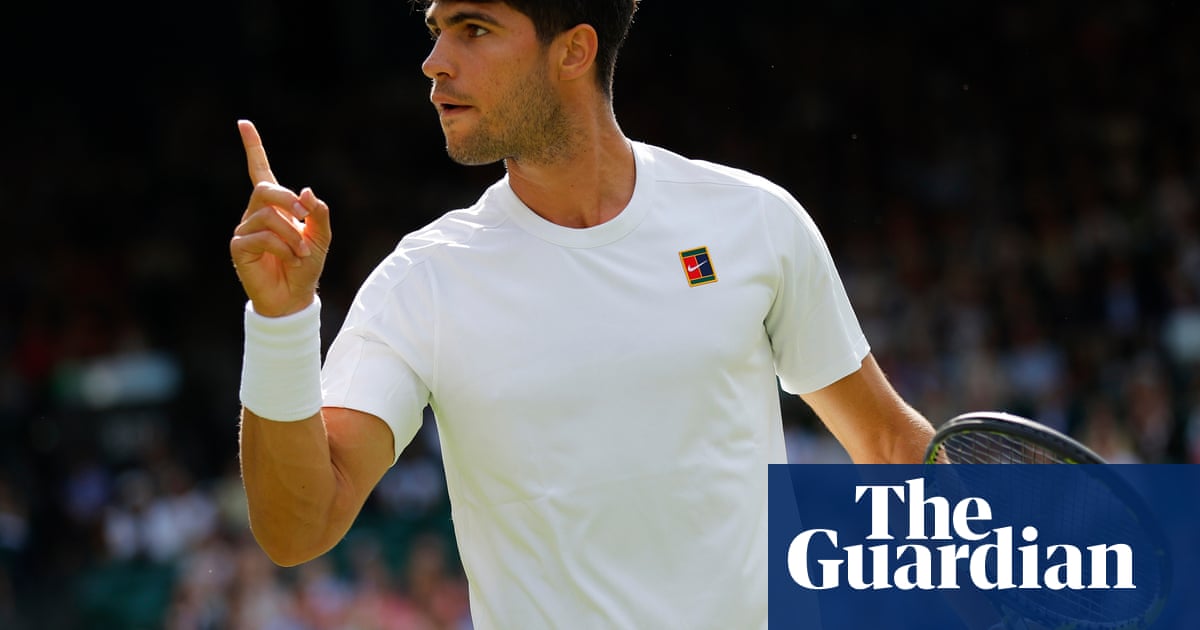There were negatives, of course. Shall we focus on the negatives? Shall we dwell on the frailties a little? The uncharacteristic errors, the double faults, an occasional scruffiness at the net, the frequent slumps in intensity? Shall we marvel at the fact that the lowest-ranked player in the tournament earned more break points (11) than one of the greatest players of his generation (10)? Shall we warn, in a tone of affected sternness, that the defending championwill have to raise his game on this evidence?
Of course we shall, because this isCarlos Alcaraz, and because there is an entire cottage industry built around maintaining the idea that Alcaraz is in a state of crisis at all times, a state of crisis so acute that it is necessary to feign round-the-clock concern for him. We just want to see all that rich talent fulfilled. That’s all it is. Sincerely and genuinely. And definitely not a weirdly prurient interest in his holidays to Ibiza, or whether him and Emma Raducanu are, you know. Just the talent. Thinking of the talent here.
And of course the illicit pleasure and enduring appeal of Alcaraz is that he so readily indulges these desires. He emotes. He misses a lot. He pulls off spectacular acrobatic winners immediately after missing a lot. He lives without inhibitions or regrets.
Alcaraz is essentially a magic-eye puzzle you can read in whatever way you want, and after thesweat-drenched psychodrama of Fabio Fogninion Monday night there were more danger signs in his 6-1, 6-4, 6-4 win over Britain’s Ollie Tarvet; if you really, really wanted to see them.
The more prosaic truth is that Alcaraz was playing himself as much as he was playing the world No 733 from St Albans. Tarvet is one of those classic British folk heroes the early rounds ofWimbledonalways seem to throw up, complete with shaggy-dog backstory and tabloid headline-friendly name. And if Alcaraz was expecting an easy afternoon of Tarvet practice, he quickly discovered that it would be anything but easy shaking off this particular Tarvet from his back.
Certainly Tarvet seemed to get an early read on the Alcaraz serve, used his speed and coverage to trade happily from the baseline, rode the early waves of noise from the home crowd. Some of his passes were sublime. Above all he looked untroubled, unfazed, hyper-confident, like a crypto-billionaire who had won a game against Carlos Alcaraz in a charity auction. “Good serve,” he called out at one point as his opponent pinned him with a vicious delivery to the body. Alcaraz shot him a look as if to say: yeah. Obviously it’s a good serve. I’m Carlos Alcaraz. Who are you again?
But of course no read on Alcaraz’s serve is ever going to rival the read he has on yours. And though both men kept swinging, while Tarvet created break points and saved others, the only real jeopardy here was of the confected variety. Tarvet probably played the best match of his life, and in the end it was like bringing a sword to a sword fight when your opponent has about six far superior swords. There was a sadistic relish to the way Alcaraz kept teasing him with the drop shot, occasionally missing, mostly succeeding.
But of course the drop shot, such a staple of the Alcaraz game, is also a stick to beat him with. Missing it costs one point, exactly the same as putting a forehand an inch long. And yet some misses are clearly more moral than others. For his detractors Alcaraz’s missed drop shots will always be taken in evidence against him, proof of his essential flimsiness.
And so, once again, we must deal with the principal charge. Alcaraz is inconsistent. It’s true, because everyone says so, to the point where it has basically passed into objective fact. Like the objective fact that Alcaraz has a win percentage of 90% so far this year, has won five of his six finals, is slowly putting together one of the greatest seasons in the modern era. His grass-court record stands comparison with the all-timers. This is the sort of inconsistency all but one of his rivals would dream of.
But of course this is a stylistic as much as it is an empirical judgment. It is true that there is a big gulf between his highest and lowest levels. That he occasionally loses to peoplelike Botic van de Zandschulp. That towards the end of last season and for a small portion of this he has looked a little unmoored, a little rattled. And yet how much of this reaction stems from a desire toseecrisis, to armchair-analyse, to draw a straight line from his personal choices to his tennis as a way of justifying our interest in his personal choices?
In a way, Alcaraz’s entire game serves as a kind of rejoinder to all this. This is, remember, still a player with just 34 tour games on grass, still adding levels and tones to his game, still learning how to master the mental side, still trying to work out exactly how famous he wants to be. In the meantime he’s going to keep going for the lines, keep going to Ibiza, keep trying the drop shot, keep embracing the chaos, because that’s the only way he knows. What if he misses, you scream. Fine. But what if he doesn’t?
